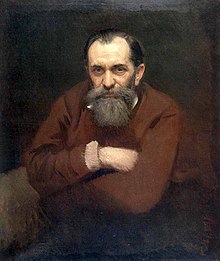Vasili Perov
| Vasily Perov | |
|---|---|

Portrait of Vasily Perov by Ivan Kramskoi
(1881) |
|
| Born |
2 January 1834 Tobolsk, Russian Empire |
| Died | 26 May 1882 (aged 48) Kuzminki, Moscow Governorate, Russian Empire |
| Nationality | Russian |
| Education |
Moscow School of Painting, Sculpture and Architecture; Imperial Academy of Arts |
| Known for | Painting |
| Notable work |
Easter Procession (1865) The Hunters at Rest (1871) Portrait of Fyodor Dostoyevsky (1872) |
| Movement | Realism, Peredvizhniki |
| Awards | Minor silver medal (1856) Grand silver medal (1857) Minor gold medal (1860) Grand gold medal (1861) |
| Patron(s) | Pavel Tretyakov |
Vasily Grigorevich Perov (Russian: Васи́лий Григо́рьевич Перо́в; 2 January 1834 (21 December 1833 O.S.) – 10 June (29 May O.S.) 1882) was a Russian painter, a key figure of the Russian Realist movement and one of the founding members of Peredvizhniki.
Vasily Perov was born on January 2, 1834 (21 December 1833 Old Style) in Tobolsk, Tobolsk Governorate, Russian Empire, as Vasily Grigorevich Vasiliev (Васи́лий Григо́рьевич Васильев). Perov was an illegitimate son of the local procurator baron, Grigory Karlovich Kridener, who belonged to an old Russian-German noble family tree, and Akulina Ivanova, a native citizen of Tobolsk. Although Perov's parents married soon after his birth, there was no legal way to inherit his father's name and baron title, so he was registered under his godfather's surname — Vasiliev. He later changed his surname to Perov — a nickname given to him by his teacher who taught him calligraphy as a child (the word pero means feather in Russian).
After completing a course at Arzamas uyezd school, Perov was transferred to the Alexander Stupin art school also located in Arzamas. In 1853, Perov was admitted to the Moscow School of Painting, Sculpture and Architecture in Moscow, where he learned from several renowned artists. In 1856, Perov was awarded with a minor silver medal for his sketch of a boy's head, presented to the Imperial Academy of Arts. Later the Academy gave him many other awards: in 1857 a major silver medal for Commissary of Rural Police Investigating, a minor golden medal for the Scene on a Grave and the Son of a Dyak Promoted to First Rank, and in 1861 a major golden medal for Sermon in a Village.
...
Wikipedia
